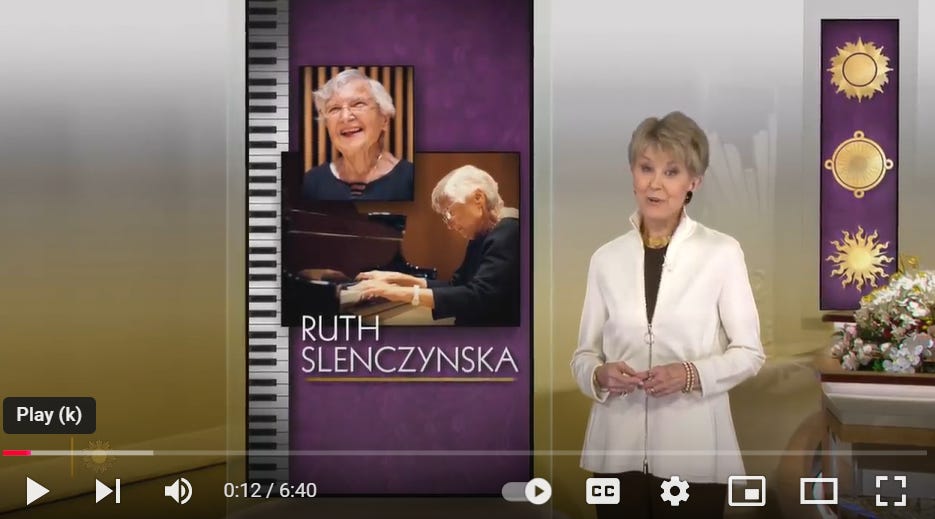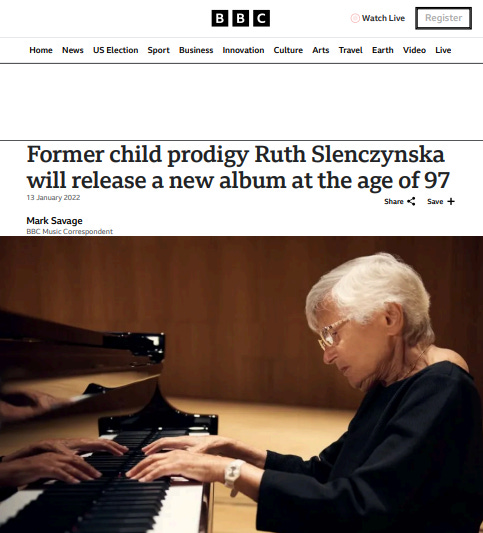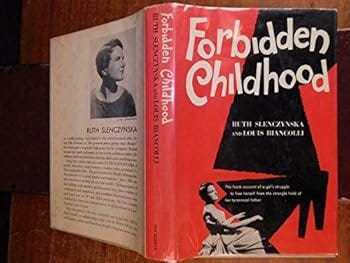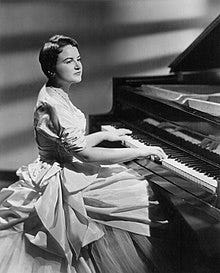Ruth Slenczynska: A Masterclass in Resilience
How a 99-Year-Old Pianist and Rachmaninoff’s Last Living Pupil Inspired Me to Live With Perseverance and Purpose
Scrolling through my social media feed, I recently came across a link to a CBS News segment from 2022 that stopped me in my tracks. Its description read:
"Hailed as one of the greatest child prodigies since Mozart, pianist Ruth Slenczynska played her first concert when she was four. Nearly a century later, Ruth is still making music, putting out a brand-new album at 97 years old, aptly titled 'My Life in Music.' She talks with correspondent Mo Rocca about the notes of her life, both high and low – from a difficult childhood, to her relationship with Rachmaninoff, playing a duet with an American president, and the experience age has gifted her."
Despite being raised in a musical family, living a life steeped in music, and eventually performing with two U.S. Army Bands, I was surprised that I hadn’t heard of Ruth Slenczynska until this CBS story crossed my feed. But after watching the segment, I understood why her name has become a quiet but enduring legend, and why the life she has led deserves our attention.
Watching her interview, I was deeply moved—not only by her music but by her story of resilience. Ruth endured years of relentless abuse at the hands of her tyrannical father, who, starting when she was three, forced her to practice 7, 8, and sometimes 9 hours a day, demanding perfection under the threat of punishment for anything less. This wasn’t just rigorous training; it was a childhood stripped of freedom, play, and any semblance of normalcy. Later, she would run away from home, determined to escape the torment, and for a time distanced herself from the piano entirely. Her survival and eventual return to music are a testament to both her strength and her commitment to pursuing life on her terms.
What inspired me most about Ruth’s story is that, despite all she endured, she never let the bitterness of those early years define her happiness. Instead, she chose optimism and resilience, grounding herself in music rather than resentment. In Forbidden Childhood, a memoir she published in 1957, she shared the hardships she endured and showed readers how she overcame them, proving that bitterness doesn’t have to dictate one’s life. Her example resonates with anyone facing trials of their own. Rejecting claims of “talent,” she credits her success to the “hard work” it took to rebuild her life and career, a decision that allowed her to reclaim the piano on her own terms.
This commitment to resilience—resisting the temptation to be bitter and paying the price of practice—is a rare quality in a world that so often emphasizes the importance of talent over dedication. As I watched that interview, Ruth talks openly about the rigorous path she’s taken, one that shows a refreshing defiance of the “talent myth.” She has dedicated countless hours, unrelenting focus, and every ounce of energy to becoming the artist she is, and even at 97 (at the time of the CBS interview, and now at 99, as I write this article), she’s still putting in the work.
After watching the CBS interview, I was so captivated that I wanted to understand more about Ruth’s journey. I wanted to become a student of her ways, not a student of the way she plays the piano, but a student of the way she lives life. I scoured the internet for interviews, read all I could find, and eventually hunted down a copy of Forbidden Childhood, printed in 1956. Only one printing was ever done, and copies are rare—especially with its cover artwork by Andy Warhol, an unusual detail that has only added to its status as a collector’s item. Finally, I found a single copy available at a used bookstore in Oregon, bought it, and immediately mailed it off to Ruth’s home in Pennsylvania, requesting her signature. A week later, it returned with her inscription, “For Ben, Ruth Slenczynska,” carefully autographed with her now-99-year-old hands—hands trained by Rachmaninoff, hands that had graced the piano in the world’s most prestigious concert halls, hands that had spent nearly a century at the keyboard, accumulating hundreds of thousands of hours.
I have many books in my library, but this signed copy holds a special place. Whenever I see it, I am reminded of Ruth’s timeless lesson of resilience as she resisted the temptation to let bitterness rule the day and paid the price of practice to become a master at her craft. It’s a reminder that we each have the power to shape our response to hardship, that we can rise above even the most challenging circumstances and choose a life lived on purpose and with purpose. Ruth’s life and music continue to echo that message. They’re not easy lessons, but they’re good ones—and when you tune into them, the music of life gains a deeper, more meaningful resonance. Ruth’s life is proof of that.
Even now, as she approaches her hundredth birthday, she continues to share her music and wisdom with the world, making her story one of the most inspiring I’ve ever encountered.








